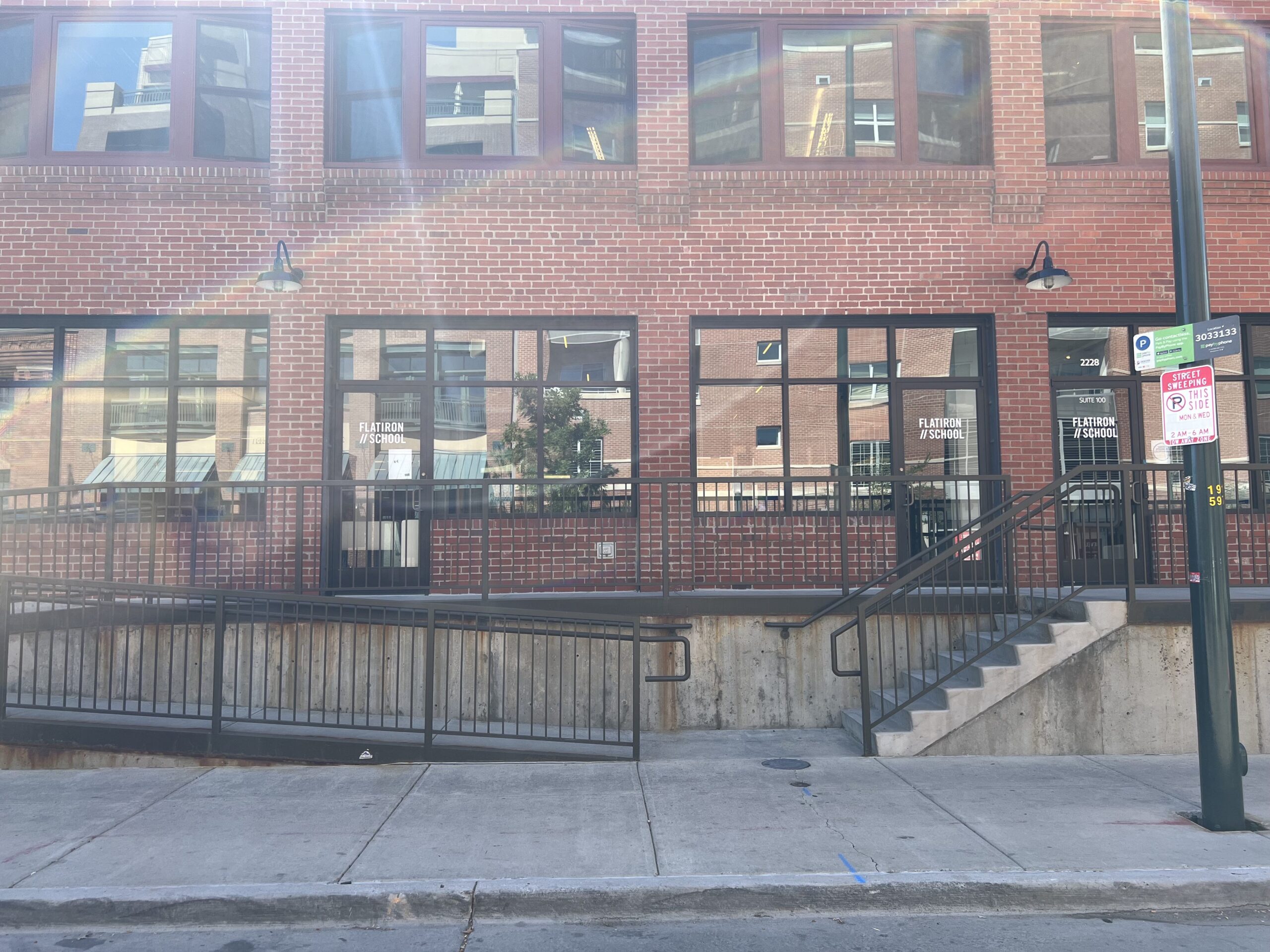
Campus Life
With a dozen Fortune 500 headquarters and a growing tech scene earning it the nickname “Silicon Mountain,” when you learn at the Denver Campus, you’ll start your career with a community of like-minded students, climbing higher than ever before.

In-Person Learning
Denver Campus can have up to 25 students per cohort but average about 16, allowing instructors to prioritize student interaction and small-group, peer-to-peer learning.

On-Campus Events
Join an affinity group (or two!) and attend regular peer networking events, alumni discussion events, happy hours, game nights, karaoke, self-care events, and more on campus.

Industry Connections
Attend industry meetups and Alumni “Ask Me Anything” panels held to expand student access to the tech industry and promote integration into the city’s professional network.

Modern Facilities
The campus has 4 primary workspaces, 2 large classrooms, lots of individual workspaces, bookable quiet rooms, storage lockers, and lounge spaces for work or play.
Learn on Campus
When you learn at our Denver Campus, you’re plugged directly into the cutting-edge of tech. You’ll learn in a city that is home to a dozen Fortune 500 companies — and they’re all looking for tech talent.
Over $8.6 Million Awarded in Scholarships
We believe that anybody who wants to pursue a career in tech should be able to do so – regardless of how they identify, their background, or financial circumstances.
We offer three different scholarships – Access Scholarship, Merit Scholarship, and Women Take Tech – to support our students in their pursuit of a better life through education.
Learn MoreUpcoming In-Person Start Dates
| Start Date | Pace | Location | Discipline | Status |
|---|---|---|---|---|
|
June 3, 2024
Software Engineering
Jun 3, 2024 |
Full-Time | Denver | Software Engineering | Open |
Graduate in as little as 15 weeks.
Upcoming Hybrid Starts
Hybrid students learn primarily online, with the option to come into campus and take advantage of co-learning spaces. The course may be online, but the community is on campus.
| Start Date | Pace | Location | Discipline | Status |
|---|---|---|---|---|
|
May 6, 2024
Software Engineering
May 6, 2024 |
Part-Time | Online | Software Engineering | Few Spots Left! |
|
May 6, 2024
Data Science
May 6, 2024 |
Part-Time | Online | Data Science | Few Spots Left! |
|
May 6, 2024
Cybersecurity
May 6, 2024 |
Part-Time | Online | Cybersecurity | Few Spots Left! |
|
May 6, 2024
Product Design
May 6, 2024 |
Part-Time | Online | Product Design | Few Spots Left! |
|
June 3, 2024
Software Engineering
Jun 3, 2024 |
Full-Time | Online | Software Engineering | Open |
|
June 3, 2024
Software Engineering
Jun 3, 2024 |
Part-Time | Online | Software Engineering | Open |
|
June 3, 2024
Cybersecurity
Jun 3, 2024 |
Part-Time | Online | Cybersecurity | Open |
|
June 3, 2024
Product Design
Jun 3, 2024 |
Part-Time | Online | Product Design | Open |
|
June 24, 2024
Software Engineering
Jun 24, 2024 |
Full-Time | Online | Software Engineering | Open |
|
June 24, 2024
Data Science
Jun 24, 2024 |
Full-Time | Online | Data Science | Open |
|
June 24, 2024
Cybersecurity
Jun 24, 2024 |
Full-Time | Online | Cybersecurity | Open |
Rather Learn Online?
Our programs are offered online in both full-time and part-time formats and can be accessed from anywhere at any time. And, if you live nearby a campus, you’ll still be able to take advantage of all on-campus amenities!
Learn Online
Your Life Won’t Wait For A Career Change
Whether you’re learning on-campus or online, you’ll always have access to your nearby campus amenities.
Full-Time
You’re ready to commit to a full-time course load, whether it’s in-person or online. You’ll graduate in 15 weeks thanks to a rigorous schedule: 8 hours a day, Monday to Friday.
- 15 weeks long
- In-person or online
- Synchronous learning with your cohort
- Access to campus working spaces
- Course highlights:
- Group work with instructor help
- Paired with design sessions
- Lab time with instructional staff
Part-Time
Our part-time course is designed for busy people. If you don’t have 8 hours to dedicate a day, then our part-time course is for you.
- Paced to complete at 40 weeks
- Online only
- Asynchronous learning at your own pace
- Access to campus working spaces
- Course highlights:
- Pre-recorded lessons
- Optional live lectures and office hours
- Discord with classmates and instructors
Get Started Towards Your Next Career
No matter what level you’re currently at, Flatiron School’s accelerated bootcamps will give you the skills you need to start a career in tech.
Ready To Apply?
Start a career in tech in as little as 15 weeks. Apply today to learn in Denver.
Have Questions?
Book a 10-minute chat with admissions to learn more about our programs.
Frequently Asked Questions
Flatiron School provides accelerated programs (aka, bootcamps) that teach you the tech skills you need to become a software engineer, data scientist, cybersecurity engineer, or product designer. We publish annual Jobs Reports and provide comprehensive Career Services so you know you’re getting a top-notch opportunity to change your career and your future.
Bootcamps offer a lot of things. They offer an opportunity to learn the skills you need to launch a career at a relatively affordable and fast pace.
What’s required of you is to find the right bootcamp. Find a place that teaches in a way that fits your learning style, meets your price point and schedule, and focuses on the languages and skills that align with your career ambitions. If you do your research and find the right place for you, then attending the right bootcamp is definitely the right choice.
Employers value people who can do the job and who can learn and adapt quickly on the job. By successfully completing a bootcamp, you’re demonstrating that you can “do” as evidenced by your projects, and that you can “learn” as evidenced by completing the program.
At Flatiron School, you’ll be able to demonstrate both. You’ll learn how to learn because new technologies and tools appear on the market every day. Our approach enables graduates to learn and apply new tools when needed. In other words, it’s not just the skills themselves that are important to hiring managers, but how you go about acquiring skills to complete a job that sets you apart.
In many ways, bootcamps definitely do work, and there’s a lot of proof behind that statement.
But it’s better to first ask yourself, “What do I want to get out of attending a bootcamp?” Asking yourself what your goals and ambitions are is how you’ll know if a bootcamp would work for you.
Some people want to just become acquainted with the basics of a field, which is great, but a full-time bootcamp might not be the best route if you’re just looking for a basic understanding.
If your goal is to learn the skills you need to change careers, then yes, bootcamps do work.
We do not require you to have prior experience to apply for any of our programs. Our admissions requirements are being at least 18 years old, having a high school diploma or a GED, having a native or bilingual fluency in English, passing the admission interview(s), and completing any required pre-work.
On-campus programs are 15-weeks long, and are held full-time and you are expected to be on campus for each day of class from 9am – 6pm local time. The Live program is also 15 weeks, but rather than going to a campus, you’ll be logged on and learning remotely full-time. Both on-campus and Live programs monitor attendance daily. The Flex program gives students up to 60 weeks to complete the curriculum, and offers the most flexibility day to day. Students enrolled in Flex programs must attend 10 check-ins in order to be eligible for graduation but are not otherwise required to attend live instructional activities.
The price of our courses reflect our unique approach to learning and support. There are many free resources that can help you learn any discipline, but given the complexity of the topic they can be difficult to navigate independently. Furthermore, students often rave about the camaraderie they establish with instructors, other students, coaches, and alumni – all valuable networking opportunities when it comes to a job search. Our courses and support after graduation are built specifically to provide the structure and community that’s required to be successful.
As for our more traditional competitors – those who are priced similarly and offer live instruction – most haven’t been around as long as Flatiron School, so they may not have the same depth of expertise, employer partner relationships, or alumni network.
The first step is to fill out a written application. Once you submit your application, you will hear back from our Admissions team regarding next steps. If your application moves forward, you will be invited to schedule a video call with a member of the Admissions team to better understand your learning needs, career goals, and whether the program is the right fit for you. Students may be required to complete an assessment as a part of the admissions process. After a technical interview, you will receive an Admissions decision within a few business days.
You have a few options in terms of financing your enrollment in one of Flatiron School’s courses. See all of your options on our Tuition & Financing page.
We also offer initiatives that can help to offset the cost of tuition on our Scholarships and Diversity Initiatives page.
The Flatiron School Career Services team exists to help get you hired. You’ll receive guidance on how to:
- Build and Optimize your LinkedIn Profile and Resume
- Ace your behavioral and technical interviews
- Grow your network of tech professionals
- Connect with Flatiron School employer partners
- Negotiate your salary
- Optimize your job search using AI
- Track job search activity using Huntr
You’ll partner with a dedicated Career Coach regularly to make forward progress each week, with up to six months of one-on-one support after graduation.
Our graduates have and continue to make lasting impact in a range of companies from small startups to Fortune 500 companies.
Companies who have hired our grads include:
- Apple
- Microsoft
- IBM
- Shopify
- VOX
- BuzzFeed
- Spotify
- Accenture
- Intel
- Kickstarter
- The New York Times
- Thought Works
- Goldman Sachs
- PWC
- Citi Bank
- Dow Jones
- Akamai
You can view our latest job placement rates in our Jobs Report.
We’ve issued a third-party examined Jobs Report each year since 2014 and remain committed to honesty and transparency with student outcomes.
If you would like to connect with a member of our team, please simply schedule a chat with one of our Admissions representatives.



